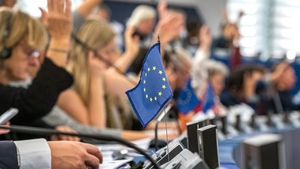Differentiation is key to understanding the European Union. This June, ARENA offers PhD students access to state-of-the-art research on all EU relevant aspects of differentiation.

Photo: European Parliament / Flickr / CC BY 2.0
STV9431 - A differentiated Europe and its implications
- Level: PhD
- Credits: 10
- Open for students enrolled in international and Norwegian PhD programmes
- No participation fee
- Teaching: 21-24 June 2022 (Oslo and online)
- Application deadline: 15.05.2022.
All modern political systems are differentiated; the EU is distinctly so. Precisely how and what the implications are for the EU and its member states remain contested.
This is why ARENA Professors John Erik Fossum and Jarle Trondal have developed the PhD course STV9431 - A differentiated Europe and its implications which will take place for the second time this year.
State-of-the-art research
Fossum and Trondal aim to offer cutting-edge theoretical and empirical knowledge in the field of EU studies.
'PhD students will gain access to state-of-the-art research on all relevant aspects of differentiation in the EU context. Differentiation is key to understanding the internal workings of the EU as well as how relations between the EU and the external world are structured and conducted', Fossum explains.
Trondal is also pleased to be able to offer this course on behalf of the top Norwegian research centre in European studies. 'It gives us an opportunity to make frontier research available to the next generation of researchers, and to discuss and get feedback on our work from rising talents in the field'.
The course will be structured around the following key themes: Conceptualizing and theorizing differentiation, EU and differentiation, Implications for Norway and the UK, and the COVID-19 pandemic and EU differentiation.
The PhD course will take place from 21-24 June and participants can take part both in person and online. The application deadline is 15.05.2022.
The course is open for both students enrolled in Norwegian PhD programmes and international PhD candidates.
Course description and admission
Linking up to international networks
The PhD training will draw resources from a large network of scholars with whom ARENA researchers collaborate.
The teaching will build upon the EU-funded project EU3D, which is coordinated by John Erik Fossum and investigates differentiation, dominance and democracy in the EU.
In addition, the training will link up to DiCE - Differentiation: Clustering Excellence, an even larger network bringing together several research clusters on differentiation, as well as the UACES Research Network on Differentiated Integration.
Through a combination of lectures by leading scholars and group work, the PhD course will introduce doctoral students to theories and observations on core aspects of differentiation in the European context.
Second year running
Last year's PhD course was well received among students.
'I would like to point out the importance and relevance of learning about a differentiated Europe and its implications. This is a key point in the current debate on how the future of Europe will be shaped', said Katerina Klimoska, course participant and PhD candidate at Ss. Cyril and Methodius University of Skopje.






